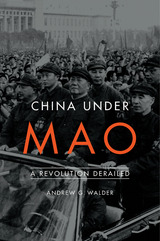
China’s Communist Party seized power in 1949 after a long period of guerrilla insurgency followed by full-scale war, but the Chinese revolution was just beginning. China Under Mao narrates the rise and fall of the Maoist revolutionary state from 1949 to 1976—an epoch of startling accomplishments and disastrous failures, steered by many forces but dominated above all by Mao Zedong.
“Walder convincingly shows that the effect of Maoist inequalities still distorts China today…[It] will be a mind-opening book for many (and is a depressing reminder for others).”
—Jonathan Mirsky, The Spectator
“Andrew Walder’s account of Mao’s time in power is detailed, sophisticated and powerful…Walder takes on many pieces of conventional wisdom about Mao’s China and pulls them apart…What was it that led so much of China’s population to follow Mao’s orders, in effect to launch a civil war against his own party? There is still much more to understand about the bond between Mao and the wider population. As we try to understand that bond, there will be few better guides than Andrew Walder’s book. Sober, measured, meticulous in every deadly detail, it is an essential assessment of one of the world’s most important revolutions.”
—Rana Mitter, Times Literary Supplement
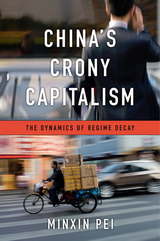
When Deng Xiaoping launched China on the path to economic reform in the late 1970s, he vowed to build “socialism with Chinese characteristics.” More than three decades later, China’s efforts to modernize have yielded something very different from the working people’s paradise Deng envisioned: an incipient kleptocracy, characterized by endemic corruption, soaring income inequality, and growing social tensions. China’s Crony Capitalism traces the origins of China’s present-day troubles to the series of incomplete reforms from the post-Tiananmen era that decentralized the control of public property without clarifying its ownership.
Beginning in the 1990s, changes in the control and ownership rights of state-owned assets allowed well-connected government officials and businessmen to amass huge fortunes through the systematic looting of state-owned property—in particular land, natural resources, and assets in state-run enterprises. Mustering compelling evidence from over two hundred corruption cases involving government and law enforcement officials, private businessmen, and organized crime members, Minxin Pei shows how collusion among elites has spawned an illicit market for power inside the party-state, in which bribes and official appointments are surreptitiously but routinely traded. This system of crony capitalism has created a legacy of criminality and entrenched privilege that will make any movement toward democracy difficult and disorderly.
Rejecting conventional platitudes about the resilience of Chinese Communist Party rule, Pei gathers unambiguous evidence that beneath China’s facade of ever-expanding prosperity and power lies a Leninist state in an advanced stage of decay.
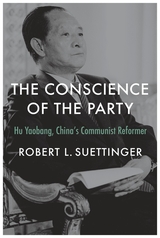
The definitive story of a top Chinese politician’s ill-fated quest to reform the Communist Party.
When Hu Yaobang died in April 1989, throngs of mourners converged on the Martyrs’ Monument in Tiananmen Square to pay their respects. Following Hu’s 1987 ouster by party elders, Chinese propaganda officials had sought to tarnish his reputation and dim his memory, yet his death galvanized the nascent pro-democracy student movement, setting off the dramatic demonstrations that culminated in the Tiananmen massacre.
The Conscience of the Party is the comprehensive, authoritative biography of the Chinese Communist Party’s most avid reformer and its general secretary for a key stretch of the 1980s. A supremely intelligent leader with an exceptional populist touch, Hu Yaobang was tapped early by Mao Zedong as a capable party hand. But Hu’s principled ideas made him powerful enemies, and during the Cultural Revolution he was purged, brutally beaten, and consigned to forced labor. After Mao’s death, Hu rose again as an ally of Deng Xiaoping, eventually securing the party’s top position. In that role, he pioneered many of the economic reforms subsequently attributed to Deng. But Hu also pursued political reforms with equal vigor, pushing for more freedom of expression, the end of lifetime tenure for CCP leaders, and the dismantling of Mao’s personality cult. Alarmed by Hu’s growing popularity and increasingly radical agenda, Deng had him purged again in 1987.
Historian and former intelligence analyst Robert L. Suettinger meticulously reconstructs Hu’s life, providing the kind of eye-opening account that remains impossible in China under state censorship. Hu Yaobang, a decent man operating in a system that did not always reward decency, suffered for his principles but inspired millions in the process.
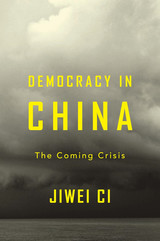
A respected Chinese political philosopher calls for the Communist Party to take the lead in moving China along the path to democracy before it is too late.
With Xi Jinping potentially set as president for life, China’s move toward political democracy may appear stalled. But Jiwei Ci argues that four decades of reform have created a mentality in the Chinese people that is just waiting for the political system to catch up, resulting in a disjunction between popular expectations and political realities. The inherent tensions in a largely democratic society without a democratic political system will trigger an unprecedented crisis of legitimacy, forcing the Communist Party to act or die.
Two crises loom for the government. First is the waning of the Communist Party’s revolutionary legacy, which the party itself sees as a grave threat. Second is the fragility of the next leadership transition. No amount of economic success will compensate for the party’s legitimacy deficit when the time comes. The only effective response, Ci argues, will be an orderly transition to democracy. To that end, the Chinese government needs to start priming its citizens for democracy, preparing them for new civil rights and civic responsibilities. Embracing this pragmatic role offers the Communist Party a chance to survive. Its leaders therefore have good reason to initiate democratic change.
Sure to challenge the Communist Party and stir debate, Democracy in China brings an original and important voice to an issue with far-reaching consequences for China and the world.
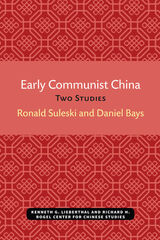
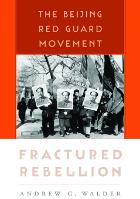
Fractured Rebellion is the first full-length account of the evolution of China’s Red Guard Movement in Beijing, the nation’s capital, from its beginnings in 1966 to its forcible suppression in 1968. Andrew Walder combines historical narrative with sociological analysis as he explores the radical student movement’s crippling factionalism, devastating social impact, and ultimate failure.
Most accounts of the movement have portrayed a struggle among Red Guards as a social conflict that pitted privileged “conservative” students against socially marginalized “radicals” who sought to change an oppressive social and political system. Walder employs newly available documentary evidence and the recent memoirs of former Red Guard leaders and members to demonstrate that on both sides of the bitter conflict were students from comparable socioeconomic backgrounds, who shared similar—largely defensive—motivations. The intensity of the conflict and the depth of the divisions were an expression of authoritarian political structures that continued to exert an irresistible pull on student motives and actions, even in the midst of their rebellion.
Walder’s nuanced account challenges the main themes of an entire generation of scholarship about the social conflicts of China’s Cultural Revolution, shedding light on the most tragic and poorly understood period of recent Chinese history.
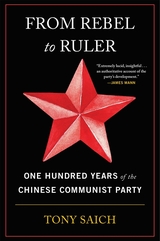
A Project Syndicate Best Read of the Year
On the centennial of the founding of the Chinese Communist Party, the definitive history of how Mao and his successors overcame incredible odds to gain and keep power.
Mao Zedong and the twelve other young men who founded the Chinese Communist Party in 1921 could hardly have imagined that less than thirty years later they would be rulers. On its hundredth anniversary, the party remains in command, leading a nation primed for global dominance.
Tony Saich tells the authoritative, comprehensive story of the Chinese Communist Party—its rise to power against incredible odds, its struggle to consolidate rule and overcome self-inflicted disasters, and its thriving amid other communist parties’ collapse. Saich argues that the brutal Japanese invasion in the 1930s actually helped the party. As the Communists retreated into the countryside, they established themselves as the populist, grassroots alternative to the Nationalists, gaining the support they would need to triumph in the civil war. Once in power, however, the Communists faced the difficult task of learning how to rule. Saich examines the devastating economic consequences of Mao’s Great Leap Forward and the political chaos of the Cultural Revolution, as well as the party’s rebound under Deng Xiaoping’s reforms.
Leninist systems are thought to be rigid, yet the Chinese Communist Party has proved adaptable. From Rebel to Ruler shows that the party owes its endurance to its flexibility. But is it nimble enough to realize Xi Jinping’s “China Dream”? Challenges are multiplying, as the growing middle class makes new demands on the state and the ideological retreat from communism draws the party further from its revolutionary roots. The legacy of the party may be secure, but its future is anything but guaranteed.
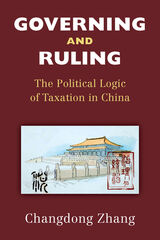
Rapid social economic changes, the transition from a planned economy to a market economy, or even economic liberalization can lead to political instability and the collapse of authoritarian regimes. Despite experiencing all of these unprecedented changes in the past forty years, China under the Chinese Communist Party’s leadership has so far successfully transformed and improved both its governance capacity and its ruling capacity. Governing and Ruling addresses this regime resilience puzzle by examining the political logic of its taxation system, especially the ways in which taxation helps China handle three governance problems: maneuvering social control, improving agent discipline, and eliciting cooperation. Changdong Zhang argues that a taxation system plays an important role in sustaining authoritarian rule, in China and elsewhere, by combining co-optation and repression functions. The book collects valuable firsthand and secondhand data; studies China’s taxation system, intergovernmental fiscal relationships, composition of fiscal revenue sources, and tax administration; and discusses how each dimension influences the three governance problems.
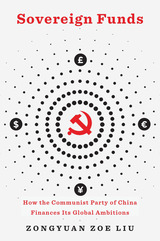
The first in-depth account of the sudden growth of China’s sovereign wealth funds and their transformative impact on global markets, domestic and multinational businesses, and international politics.
One of the keys to China’s global rise has been its strategy of deploying sovereign wealth on behalf of state power. Since President Xi Jinping took office in 2013, China has doubled down on financial statecraft, making shrewd investments with the sovereign funds it has built up by leveraging its foreign exchange reserves. Sovereign Funds tells the story of how the Communist Party of China (CPC) became a global financier of surpassing ambition.
Zongyuan Zoe Liu offers a comprehensive and up-to-date analysis of the evolution of China’s sovereign funds, including the China Investment Corporation, the State Administration of Foreign Exchange, and Central Huijin Investment. Liu shows how these institutions have become mechanisms not only for transforming low-reward foreign exchange reserves into investment capital but also for power projection. Sovereign funds are essential drivers of the national interest, shaping global markets, advancing the historic Belt and Road Initiative, and funneling state assets into strategic industries such as semiconductors, fintech, and artificial intelligence. In the era of President Xi, state-owned financial institutions have become gatekeepers of the Chinese economy. Political and personal relationships with prestigious sovereign funds have enabled Blackstone to flourish in China and have fueled the ascendance of private tech giants such as Alibaba, Ant Finance, and Didi.
As Liu makes clear, sovereign funds are not just for oil exporters. The CPC is a leader in both foreign exchange reserves investment and economic statecraft, using state capital to encourage domestic economic activity and create spheres of influence worldwide.
READERS
Browse our collection.
PUBLISHERS
See BiblioVault's publisher services.
STUDENT SERVICES
Files for college accessibility offices.
UChicago Accessibility Resources
home | accessibility | search | about | contact us
BiblioVault ® 2001 - 2024
The University of Chicago Press









